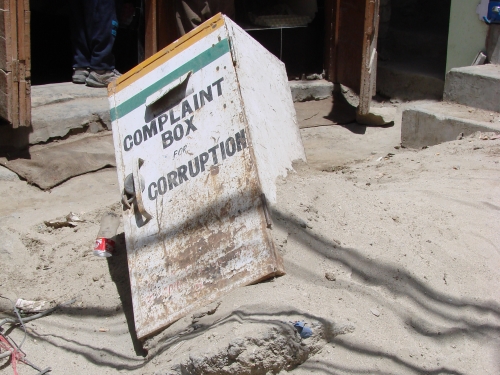
This article was originally published by Open Democracy on 4 September, 2015.
This summer in Pakistan, a massive corruption scandal erupted involving collusion between between political parties and public officials over illegal land-grabbing in the city of Karachi, capital of the country’s most populous province, Sindh. A report published in June 2015 by the Pakistani Rangers, a legal paramilitary force under the direct control of the interior ministry, provided hard evidence of the so-called “evil nexus”.
The role of political parties is important, for in Pakistan they are perceived – along with the national police force and civil servants – as among the most unreliable and corrupt institutions. Data from Transparency International confirms this distrust, which this most recent scandal did nothing to rebuild. Instead it stands as yet another example of how dirty money, when it seeps into politics, can seriously damage democratic institutions.
Illicit funds can enter politics in various ways, whether political-party finance systems, campaign support or allocation of lucrative contracts. In every case, this threatens not only the effectiveness but the legitimacy of all democratic bodies.
As elected representatives, entrusted to lead the nation, politicians are at the heart of democracy. For the public it is disturbing to see them negotiating deals with networks of criminals engaged in particularly sinister crimes such as human trafficking, drug-smuggling, weapons-trading, counterfeiting or terrorism. Pakistan is not an exception in this regard. The corrosive effect of organized crime being able to buy real political influence is a global problem.
In July 2015, a United Nations agency in charge of fighting impunity in Guatemala released a disturbing report concluding that alliances with organized crime are one of the most harmful activities for democracy in the country. Here, as in Pakistan and other countries, such alliances and the dirty money they depend on undermine political systems, nourish political violence, contaminate elections and hurt democratic governance (including at the local level).
That these criminal interests often involve violence heightens the injury to public interest and safety. Money from “blood diamonds”, for example, has provided funding for military regimes and insurgencies, prolonging conflicts as well as systematic and gross violations of human rights in African countries. Drug money also fuels insurgencies’ budgets and prolonged conflicts in countries such as Colombia and Afghanistan.
Moreover, funding from illicit sources undermines electoral processes. Peru, for example, held elections in October 2014. Yet less than ten months later, seventeen out of 124 elected representatives – 14% of the total – have been linked with drug cartels or their activities.
In May 2015, parts of the government apparatus and civil-society organizations in Peru were moved to warn that the country’s state institutions are at risk of being infiltrated by the cartels. This would send the country back to the 1990s, when despairing Peruvians felt they were living in a narco-state. This is indeed a worrisome pattern as it damages the legitimacy of elections as well as trust in local governance and decentralisation programmes.
Such issues are emphasized in a particular regional context by an International IDEA report, Illicit Networks and Politics in Latin America, published in November 2014.
There is no single or fixed recipe for preventing or mitigating the bond between criminal networks and politics. But acknowledging the problem is a first step to finding useful solutions. Disbanding entire criminal networks is perhaps unrealistic, as organised crime will probably always exist. But protecting politics from being taken over by thugs might be a more attainable goal.
The focus then should be on how to prevent dirty money from getting into politics, or at the very least limit the influence it might buy. It is also necessary to prevent crime groups from forming strong bonds with elected officials, public servants and institutions. The dangers of this process are explored in a 2015 study by the Global Initiative against Transnational Organised Crime, which concludes that decentralisation has provided a golden opportunity for crime groups to “buy” civil servants and politicians at local level in some countries, for example Mali.
Two key elements here are coordination and transparency. The ability of law-enforcement agencies, electoral-management bodies, banks’ and intelligence agencies’ financial units to work together in tracking asset-laundering is vital. So is including political parties in exposures of money-laundering, which could mean monitoring political-party funding beyond election times and ensure that cash contributions to candidates are properly reported.
In countries like Myanmar, where there are great hopes for the current democratic transformation, there is an opportunity to introduce preventative measures early on in the process. In parallel with preparations for open elections in November 2015 (its first in twenty-five years), Myanmar is re-emerging as a key player in the illicit-drugs underworld.
Myanmar is the second largest producer of heroin in the world according to United Nations estimates, and Asia’s leading supplier of methamphetamine. Whether it’s called junk or heroin, injected or smoked (“chasing-the-dragon” style), heroin could become a major challenge in Myanmar’s transformation to democracy. It is up to democracy-support agencies, national and international, to prevent the current breath of democracy in Myanmar turning into a junk-like smell.
Catalina Perdomo is programme officer for the democracy, conflict and security programme at the International Institute for Democracy and Electoral Assistance (International IDEA)

This work is licensed under a Creative Commons Attribution-NonCommercial 4.0 International License.
For more information on issues and events that shape our world, please visit ISN Security Watch or browse our resources.

